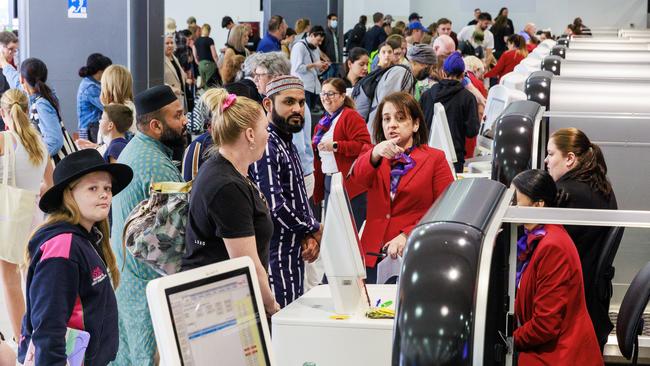Melbourne Airport breaks its six-year-old international travellers record for March
A record number of international travellers passed through Melbourne Airport in March, thanks to the Formula One Grand Prix and the start of Turkish Airlines services.

Melbourne Airport has set a new March record for international passengers as Australian newcomer Turkish Airlines added capacity, and visitors poured in for the Formula One Grand Prix.
A total of 923,065 international travellers passed through Tullamarine’s terminal 2, up from the previous record of 916,849 in March 2018.
The result was aided by the entry of Turkish Airlines, which began a three-time-a-week service from Istanbul on March 2.
For the year to March, international passenger numbers were up 28 per cent compared with the previous 12 months, whereas growth in domestic travellers was just 5 per cent.

Melbourne Airport CEO chief executive Argus said the international market demonstrated that competition and capacity helped reduce airfares, and allowed more people to travel.
She said it was clear that Victorians wanted to travel but domestic flying continued to be “constrained by reduced capacity and higher airfares”.
“While that continues, it’s unlikely we will see a full recovery in the local market in the near future,” Ms Argus said.
“It’s important to acknowledge that airlines are grappling with a number of factors outside of their control but it’s also worth noting that while domestic airfares went up over the Grand Prix weekend and Easter, the one thing that didn’t increase over those periods was the airport charge the airlines pay.”
Data released by Airservices Australia showed Virgin Australia operated seven fewer flights a day across its network in March compared with the same time last year.
Compared to pre-Covid, the airline was 7 per cent under capacity – or operating 35 fewer flights a day than in March 2019 – due to a smaller fleet and delays in the delivery of new aircraft.
At the same time Qantas was only just ahead of where it was last year, up 2 per cent or 14 additional flights a day, but well ahead of pre-Covid levels with an extra 72 flights a day.
Jetstar operated an extra 36 flights a day across its network compared to March 2023, and was 15 per cent ahead of 2019 capacity.
Airservices noted that its own capacity constraints arising from staff shortages affected 1.3 per cent of all flights in March, and only 1 per cent of all cancellations were their fault.
Industrial turbulence lies ahead. Aviation firefighters employed by Airservices plan a four-hour stoppage from 6am on Monday, April 15, at up to 27 airports.
Air traffic controllers were also in the process of voting on protected industrial action, and the results of their ballot will be finalised early next month.







To join the conversation, please log in. Don't have an account? Register
Join the conversation, you are commenting as Logout